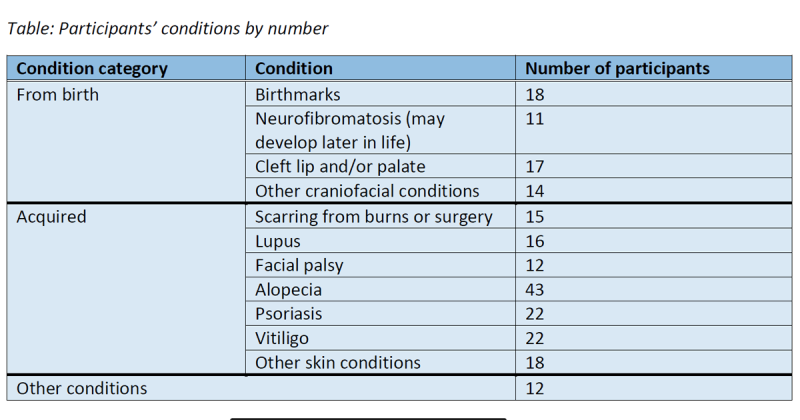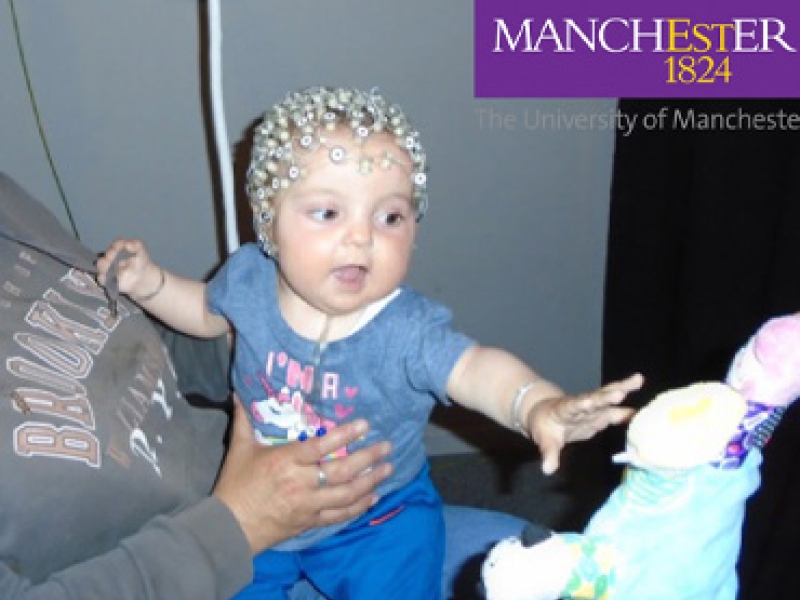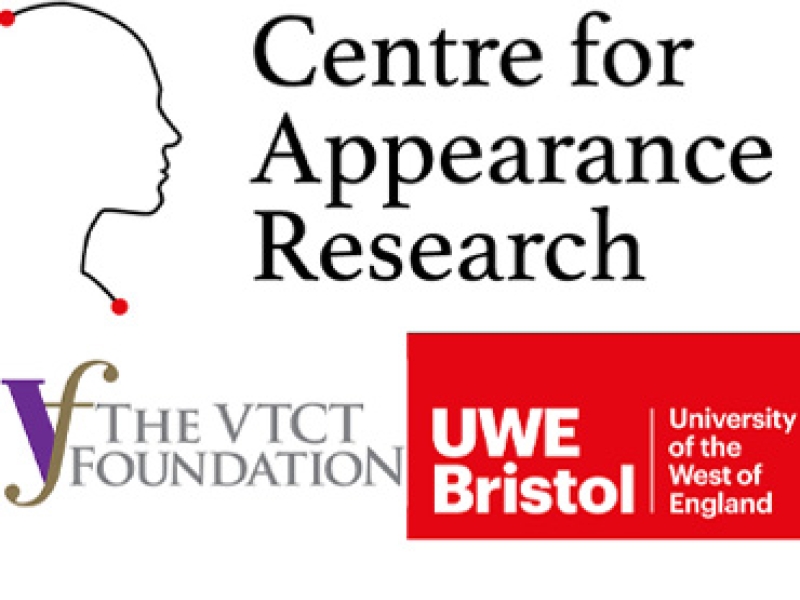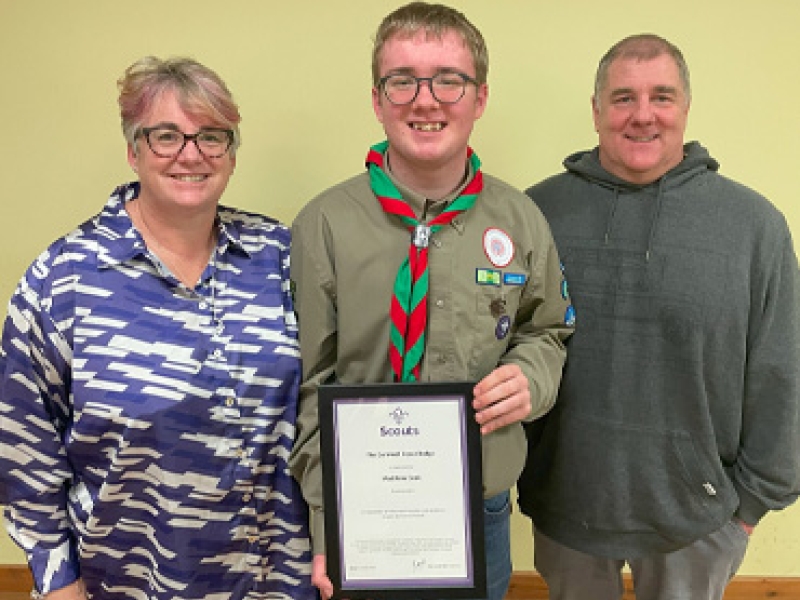Looks and Life: A summary of the study
23 August 2019
Looks and Life: A summary of the study
What we wanted to learn
We were interested in how people with a health condition that affects their appearance deal with difficult thoughts and feelings about their appearance. We know from previous research that some people avoid activities that they expect will bring up difficult thoughts and feelings, and some spend a lot of time and energy covering, concealing and focusing on their appearance. We wanted to learn more about two mental tendencies: (1) a desire to get rid of or avoid difficult thoughts and feelings (called ‘experiential avoidance), and (2) getting caught up with difficult thoughts (called ‘cognitive fusion’). Specifically, we wanted to know whether these two tendencies might explain why people with conditions that affect their appearance are more or less likely to (a) avoid stressful appearance-related activities, and (b) to cover, conceal and focus on their appearance.
What we did
To do this, we asked charities and organisations from the Appearance Collective to help us recruit participants across a wide range of appearance-affecting conditions (a breakdown by condition type is given below). Thanks to these organisations, we surveyed 220 adults, aged 18-75, just under 80% of whom were female. Participants completed demographic questions, a series of validated psychological questionnaires, and gave details about how their condition affects their appearance. We ran statistical analyses called Mediation analyses, to find out how well (1) experiential avoidance and (2) cognitive fusion statistically explained participants’ tendency to (a) avoid stressful appearance-related situations and (b) cover, conceal and focus on their appearance. In the analyses, we took account of participants’ age, gender, how visible they perceived their different appearance to be to others, and whether their condition was acquired or from birth.
What we found
We found that participants’ level of (1) experiential avoidance (a tendency to try and get rid of or avoid difficult thoughts and feelings) did partly explain their tendency to (a) avoid stressful appearance-related situations. The more experientially avoidant they were, the more likely they were to avoid stressful situations. Experiential avoidance didn’t, though, explain participants’ tendency to (b) cover, conceal and focus on appearance. On the other hand, participants’ level of (2) cognitive fusion (getting caught up in thoughts) explained both (a) avoiding stressful situations and (b) cover, concealing and focusing on appearance. The more participants were caught up in thoughts, the more they’d avoid stressful situations, and the more they’d cover, conceal and focus on their appearance.
What this means
We now know that these two mental tendencies are likely to play a role in how people cope with difficult thoughts and feelings about their appearance. Many types of psychological therapy (like traditional cognitive behavioural therapy) try to help people manage distress by teaching them to change their thinking patterns from less rational to more rational. What the findings of the study suggest is that they may be another way: Learning to just observe thoughts as thoughts rather than facts (‘cognitive defusion’) and learning to open up to and tolerate difficult thoughts and feelings (‘experiential acceptance’), without trying to change those internal experiences, may help people with appearance-affecting conditions engage more in meaningful activities that they may otherwise avoid. An approach called Acceptance and Commitment Therapy (or ‘ACT’) focuses on developing cognitive defusion and experiential acceptance, and we at CAR are currently developing a self-help programme based on ACT that we would like to test in the near future.

Filter News
_370x280_800_600_s_c1.jpg)
Jen’s NF1 story
Jen praises the great support received since her NF1 diagnosis, allowing her to thrive & achieve a 1st class degree.
Read More_800_600_s_c1.png)
Charlotte & Evie’s story
'Sticker Queen' Evie is 4 years old and was diagnosed with NF1 after tests for a 'lazy eye'.
Read More_800_600_s_c1.png)
Luke’s Story
Luke had NF1 since childhood. Now an adult, surgery last year has enabled him to play football and do whatever he wants
Read More_800_600_s_c1.png)
Charlotte’s Story
When Charlotte was 6, she was diagnosed with NF1, along with her brother & dad. Now she is on a mission to raise awareness
Read More
Eden P for healthcare professionals
Healthcare professionals, who provide support to expectant parents with NF1 are invited to take part in the Eden P study
Read More_370x280_800_600_s_c1.jpg)
Nicole’s story
Nicole has NF2, she describes the preparations and the absolute joyful experience of the birth of her son Lewis
Read More
CAR Research - exploring family planning decisions
Research Advisors required to help explore what influences decisions about having children and what support would be helpful
Read More
Corporate Fundraising 2024
Find out some of the different ways your company can support Nerve Tumours UK
Read More
Matthew’s story
Matthew, who has NF2 and is a dedicated Scout, has been awarded the prestigious Cornwell Scout Badge
Read More
